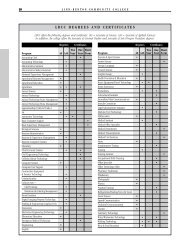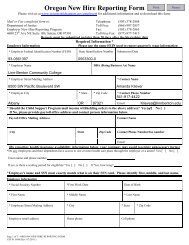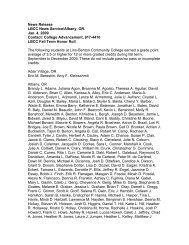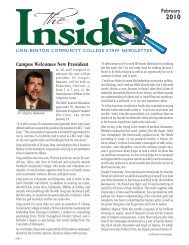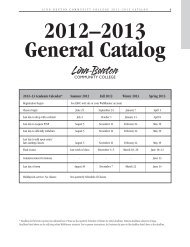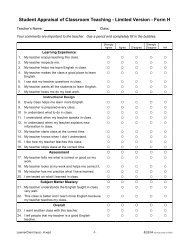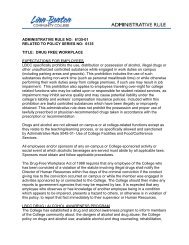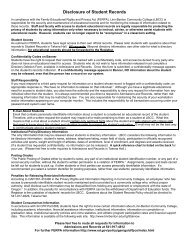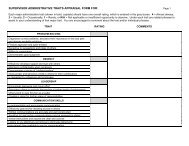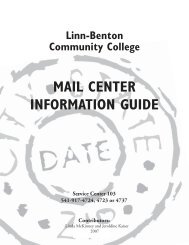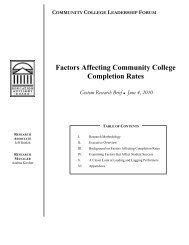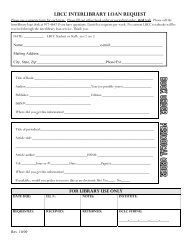2013-2014 LBCC Catalog (complete PDF file) - LBCC Paperless ...
2013-2014 LBCC Catalog (complete PDF file) - LBCC Paperless ...
2013-2014 LBCC Catalog (complete PDF file) - LBCC Paperless ...
You also want an ePaper? Increase the reach of your titles
YUMPU automatically turns print PDFs into web optimized ePapers that Google loves.
A S S O C I A T E O F S C I E N C E D E G R E E S 41<br />
institution and take those classes at <strong>LBCC</strong>. You may want to work with<br />
two advisors; one at <strong>LBCC</strong> and a second at the institution you hope to<br />
attend to make sure you are taking the courses that will meet program<br />
requirements.<br />
Many students start at terms other than fall term and take night classes<br />
as well as day classes. Some students attend part time.<br />
Student Learning Outcomes<br />
Students who successfully <strong>complete</strong> an Associate of Science degree with<br />
an emphasis in Engineering Transfer will:<br />
• Apply knowledge of mathematics to formulate and solve<br />
engineering problems.<br />
• Use computers to solve engineering problems.<br />
• Properly set up and follow a process to solve engineering problems.<br />
Program Requirements<br />
Students entering the program with solid high school backgrounds in<br />
physics, chemistry and pre-calculus can expect to <strong>complete</strong> the program<br />
in two years. Students who need to <strong>complete</strong> any pre-calculus classes<br />
after their arrival on campus should expect to spend more than two years<br />
in the program. Many of the courses listed as fall term freshman courses<br />
have prerequisites. Entering students who are deficient in mathematics,<br />
chemistry, writing or reading commonly spend three years at <strong>LBCC</strong><br />
before transferring to a four-year institution.<br />
CH 201 Chemistry for Engineering Majors and CH 221 General<br />
Chemistry (depending upon the student’s intended engineering area<br />
of emphasis) are usually taken in the first or second terms of the<br />
Engineering Transfer degree program. These courses require that the<br />
student possess a basic knowledge of chemistry prior to enrolling. In<br />
order to fulfill this requirement a student must either:<br />
• Pass a Chemistry Entrance Exam, or<br />
• Take a college-level chemistry course (CH 112, CH 121, or CH 150).<br />
To schedule an entrance exam or for further information contact:<br />
Linda Taylor at taylorl@linnbenton.edu or 541-917-4741.<br />
Students should be prepared to purchase a scientific-type electronic<br />
calculator.<br />
T R A N S F E R<br />
Associate of Science with an emphasis in<br />
Engineering Transfer<br />
See the front of this section for graduation requirements for the<br />
Associate of Science degree.<br />
General Education Requirements:................................. 43<br />
Classes shown below in italic are general education classes.<br />
Program Requirements:................................................ 66<br />
Course No. Course Title<br />
Credits<br />
Biological Science................................................. 4<br />
CH 201 Chemistry for Engineering Majors or<br />
CH 221 General Chemistry................................................ 4(1)<br />
(Four credits apply toward general education<br />
requirements; one credit applies toward program.)<br />
CH 202 Chemistry for Engineering Majors II or<br />
CH 222 General Chemistry......................................................... 5<br />
Cultural Diversity................................................. 3<br />
Difference, Power & Discrimination...................... 3<br />
COMM 111 Fundamentals of Speech or<br />
COMM 112 Introduction to Persuasion................................... 3<br />
ENGR 111 Engineering Orientation I............................................. 4<br />
ENGR 112 Engineering Orientation II........................................... 4<br />
Literature & the Arts.............................................. 3<br />
MTH 251 Differential Calculus............................................. 4(1)<br />
(Four credits apply toward general education<br />
requirements; one credit applies toward program.)<br />
MTH 252 Integral Calculus........................................................... 5<br />
MTH 253 Calculus......................................................................... 4<br />
MTH 254 Calculus......................................................................... 4<br />
MTH 256 Applied Differential Equations...................................... 4<br />
PH 211 General Physics with Calculus............................... 4(1)<br />
(Four credits apply toward general education<br />
requirements; one credit applies toward program.)<br />
PH 212 General Physics with Calculus...................................... 5<br />
PH 213 General Physics with Calculus...................................... 5<br />
PE 231 Lifetime Health & Fitness....................................... 3<br />
Social Processes & Institutions............................... 3<br />
Western Culture.................................................... 3<br />
WR 121 English Composition............................................. 3<br />
WR 227 Technical Writing.................................................. 3<br />
Engineering Electives.................................................... 24<br />
Total Credits Required: 108<br />
Approved Electives<br />
From the following list of approved electives, select courses that are<br />
required for your major at the institution you plan to attend.<br />
A minimum of four elective courses must either have an ENGR prefix<br />
or be CEM 263, CH 241, or CH 242.<br />
CEM 263 Plane Surveying (3 credits)<br />
CH 223 General Chemistry (5 credits)<br />
CH 241 Organic Chemistry (4 credits)<br />
CH 242 Organic Chemistry (4 credits)<br />
CH 243 Organic Chemistry (4 credits)<br />
CS 161 Introduction to Computer Science I (4 credits)<br />
CS 162 Introduction to Computer Science II (4 credits)<br />
EC 201 Introduction to Microeconomics (4 credits)<br />
EC 202 Introduction to Macroeconomics (4 credits)<br />
ENGR 201 Electrical Fundamentals: DC Circuits (4 credits)<br />
ENGR 202 Electrical Fundamentals: AC Circuits (4 credits)<br />
ENGR 203 Electrical Fundamentals: Signals & Controls (4 credits)<br />
ENGR 211 Statics (4 credits)<br />
ENGR 212 Dynamics (4 credits)<br />
ENGR 213 Strength of Materials (4 credits)<br />
ENGR 242 Introduction to GIS (3 credits)<br />
ENGR 245 Engineering Graphics: Civil (3 credits)<br />
ENGR 248 Engineering Graphics: Mechanical (3 credits)<br />
ENGR 271 Digital Logic Design (3 credits)<br />
ENGR 272 Digital Logic Design Lab (1 credit)<br />
MTH 255 Vector Calculus (4 credits)<br />
MTH 265 Statistics for Scientists & Engineers (4 credits)<br />
Note: Students majoring in Chemical Engineering, Environmental<br />
Engineering, and Bioengineering should take CH 221, CH 222 and CH<br />
223 instead of CH 201 and CH 202.<br />
Students majoring in Construction Engineering Management at OSU<br />
should take BA 215, BA 226, and BA 275 instead of MTH 253, MTH 254,<br />
MTH 256, CH 202, and PH 213<br />
1–Courses offered that term only.<br />
2–Other classes may substitute. See advisor.<br />
6–These courses must have been <strong>complete</strong>d within the last five years.<br />
7–Course may be taken any term to accommodate a student’s particular interests and scheduling<br />
considerations. See the requirements for the Associate of Science degree for approved courses.<br />
8–No more than two courses with the same alpha prefix may be used by a student to meet the<br />
general education requirement. See an advisor.<br />
9–A cost-recovery program. See “Workforce Training” section for details.




